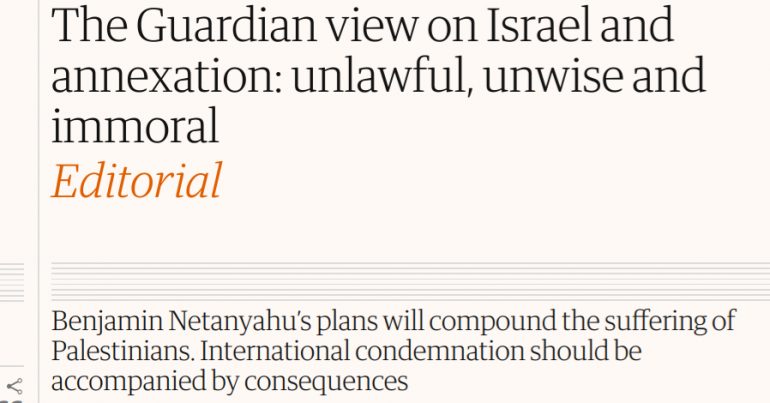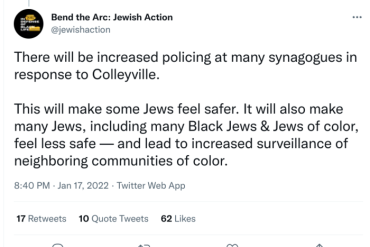Guardian editorials on Israel can usually be relied upon to include the following elements of bias:
- Denying Palestinians agency – treating them entirely as victims, erasing decisions their leaders have made that are inimical to peace, and acting as if Israelis are the only party in the conflict that matters.
- Obsessive focus on settlements, whilst ignoring other issues relevant to the absence of peace.
- Using demonising rhetoric in condemning Israeli actions.
The first paragraph of the Guardian editorial published yesterday (“The Guardian view on Israel and annexation: unlawful, unwise and immoral”, June 30), as with the rest of the piece, evokes these three dynamics:
Annexation looks like the executioner of the two-state solution. Israel has changed the facts on the ground, with the rapid growth of settlements rendering that goal less and less viable. But the declaration of sovereignty over parts of the occupied territories, in putting a formal seal on physical realities, will be a new and terrible moment, and above all a fresh injustice to Palestinians.
Denial of Palestinian agency:
Not only is the – possible but far from certain – partial annexation of the West Bank seen a “fresh injustice” to Palestinians, but nothing in the opening sentence, nor in the rest of the 578 word op-ed, even alludes to the question of what Palestinians can do now or could have done in the decades since Oslo to advance the peace process.
In fact, editors even omitted reports on Monday that the PA stated its willingness to renew negotiations with Israel. This is important as it suggests Mahmoud Abbas reached the conclusion – never enunciated in the Guardian – that the PA’s prior decision to refuse talks with Israel and the US was detrimental to their interests. The editorial also of course fails to mention Palestinian decisions to reject offers of statehood since Oslo (deals that would have given Palestinians nearly everything they asked for).
Bad decisions by Palestinian leaders inevitably lead to bad outcomes for the Palestinian people.
Obsessive focus on the settlements:
As we’ve argued previously, whatever one’s view on Israeli communities built across the 1949 armistice lines, and its impact on a peaceful solution, the Guardian’s myopic, obsessive focus on such settlements – framing them as the root cause of the conflict – obscures three inconvenient facts:
The violent intifada from 2000-2005, ignited and led by Palestinian leaders after they walked away from an Israeli offer of statehood, led to an organic reassessment – by Israelis from across the political spectrum – of Palestinian leaders’ intentions.
Israel’s unilateral withdrawal of all settlements and soldiers from Gaza not only didn’t lead to peace, but, with the rise of Hamas, led to dramatically increased terror – especially for Israel’s Gaza envelope communities.
Also, most new settlement homes have been built in major settlement blocks – territory that, under any two-state solution, would remain part of Israel. So, to suggest that settlement construction anywhere in the West Bank is intrinsically harmful to a two-state solution is inaccurate.
Demonising rhetoric:
The word “executioner” is a telling word choice in characterising Israeli actions – evoking the idea that settlements and possible annexation can be seen as an act of violence against peace.
Later in the editorial, we’re told that “Israeli voices that angrily rejected comparisons with apartheid South Africa in the past now draw it themselves as they contemplate the institutionalisation of the military occupation, without the granting of citizenship or equal rights to Palestinians”.
First, the word should be “voice”, not “voices”, as they’re referring to the views of one Israeli – the South African-born Benjamin Pogrund. Moreover, the demonisation of Israel as an “apartheid state” is no less of a lie merely because one Israeli citizen legitimises – though, let’s remember, only regarding a now still theoretical annexation. Additionally, Alternate Prime Minister Benny Gantz has pledged he’d only support the application of Israeli law to West Bank territory if Palestinians living there were granted equal rights – meaning that, contrary to the Guardian’s suggestion, they’d be given full citizenship.
Also, though we don’t know what territory, if any, Israel will end up applying sovereignty to, the word apartheid is – by definition – fundamentally inaccurate in describing the situation in the West Bank. The conflict, including questions regarding the fate of Palestinians under Israeli control, has never been about race. Nor has there been an “institutionalised regime of systematic oppression and domination by one racial group” [the definition of apartheid under the 1998 Rome Statute]. Rather, it’s a complex political dispute involving two people with distinct national claims over the same piece of land.
The editorial is predictable in its demonisation of Israel, ahistorical in it’s characterisation of settlements as the sine qua non of the conflict, and illiberal in denying Palestinians agency – liberal racism continually on display at the Guardian that’s no less pernicious than the right-wing variety.





Article omits bias in framing issue as “annexation” and not addressing difference with “extension of sovereignty.” Also limited geographic scope. Incitement. Context of 1.7 billion Arabs, 9 million Jews. History. etc.